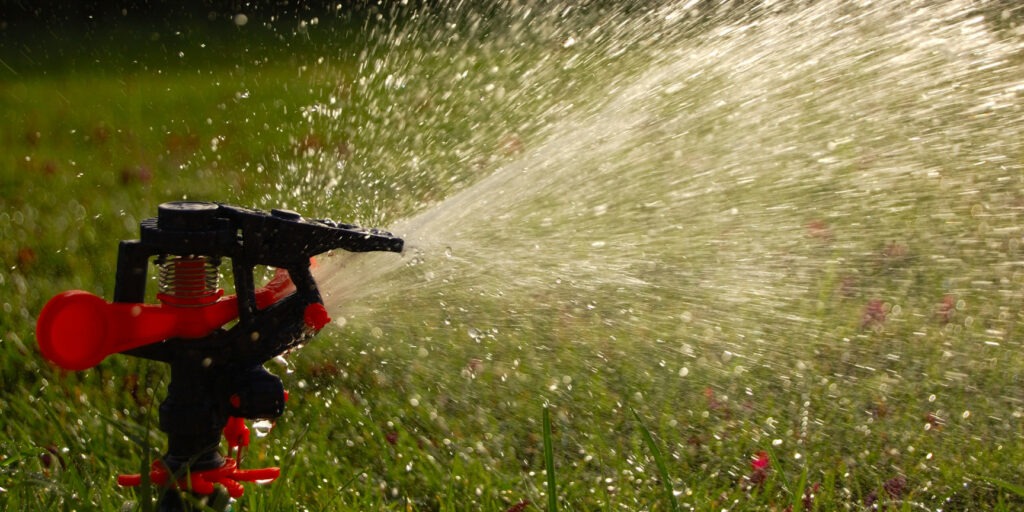If you live in Knoxville, you know how unpredictable East Tennessee weather can be. You don’t water the lawn one day because it’s supposed to storm, but then it never does. Then a week of rain threatens to make your backyard a swamp.
Hot summers especially have unpredictable rainfall, and both soil conditions and your irrigation techniques make a big difference. By following these tips, you’ll have a lush lawn all year long.
5 Tips for Watering Your Lawn
1. Know local weather conditions
Knowing East Tennessee’s weather patterns, such as hot summers and occasional droughts, helps you water your lawn effectively. For example, a good rule of thumb is 1” of water per week during the growing season. If you only receive 0.5” of rain, then you know to add more. This ensures your lawn gets enough water during dry spells and avoids wasting water during rainy periods, which supports healthier grass growth.
2. Check your soil moisture before watering
Gauge soil moisture before watering your lawn by poking a screwdriver in the ground. If the soil’s damp 4 to 6 inches below, postpone watering. This practice saves water, protects our resources, and fosters lush, healthy grass.
3. Water early in the morning
Aim to water early for the best lawn watering routine—ideally before 10 a.m. Doing so allows moisture to penetrate deep into the soil before the sun heats up, reducing water evaporation. This maximizes water efficiency, promoting robust root growth and a healthier lawn overall.
4. Use proper irrigation techniques
For optimal watering, consider installing lawn sprinklers or a drip system. Methods like lawn sprinklers ensure even water distribution throughout your yard.
Investing in a quality irrigation system:
- Maximizes water efficiency
- Boosts grass health
- Makes lawn maintenance easier
5. Water your grass deeply a couple of times a week
Nurture your lawn by watering deeply but less frequently. This helps to avoid shallow watering and encourages roots to grow deeper, making your grass more resilient to drought. Aim for 1 to 1.5 inches of water each week, factoring in rainfall, to keep your lawn thriving and lush.
Problems with Underwatering
Underwatering your lawn can harm its health and appearance by causing the grass to lose its vibrant green color. Grass may turn to a dull bluish-gray, indicating stress and reducing its visual appeal.
Additionally, not watering enough can change the shape of grass blades. Instead of their usual full and wide appearance, the blades may become wilted and thin, further detracting from the overall attractiveness of the lawn. It can also slow down grass growth with nutrients struggling to reach the roots, resulting in sluggish growth and the grass not reaching its full potential.
Underwatering can cause a delay in your lawn’s recovery from stress or damage. When the soil lacks moisture, the grass finds it difficult to bounce back to its original shape after being compressed or trampled. This delayed recovery can leave your lawn looking uneven and messy for a prolonged period.
Problems with Overwatering
You may not think about it as much, but overwatering your lawn can be just as harmful as underwatering it. The soil in your lawn is home to beneficial microbes that play a vital role in keeping it healthy. These microbes help maintain a balanced environment and fend off harmful invaders.
However, when you overwater, you drown these essential microbes. Without them, your soil becomes susceptible to invasion by unwelcome guests like:
- Moss
- Algae
- Fungi
These intruders can quickly spread across your lawn, spoiling its appearance and health.
Overwatering can also result in the development of brown patches. Too much moisture can stress the grass, causing it to wither and turn brown in certain areas. Soil compaction is another issue. Soil becomes dense and tough when constantly soaked, making it hard for roots to grow and access vital nutrients. Compaction restricts growth and weakens the health of your lawn.
Watering Grass Based On the Seasons
You can adjust watering according to the seasons to maintain a healthy lawn all year long. In Knoxville, rain is more frequent in the spring and summer. Scale back or stop watering during this time to avoid overdoing it. Rain tends to be more scarce the rest of the year. Water more often during fall, or dry spells to keep your grass thriving.
Watering your grass based on the seasons helps:
- Manage water use,
- Promote lush growth, and
- Keeps your lawn vibrant year-round
Aligning your watering routine with seasonal weather patterns is key to effective lawn care. It helps ensure your yard stays beautiful while conserving water.

Partner with Grover Turf Care to Protect Your Lawn in Knoxville
At Grover Turf Care, we go beyond basic watering to ensure your lawn thrives. We know that lawns need more than just water—they require nutrients and fertilization for optimal health. Our organic turf care and golf course-inspired approach consider factors like yard slope, tree coverage, and flower bed arrangements to craft a customized fertilization plan.
This strategic method ensures efficient fertilization with minimal passes, resulting in a lush and healthy lawn. With Grover’s expertise, you can achieve vibrant landscaping and maximize the effectiveness of your lawn care efforts while adding to Knoxville’s natural beauty.
Making your lawn flourish is our passion. Contact us today to schedule an appointment.
To avoid overwatering and under-watering your lawn, adjust how much you water based on local weather, check soil moisture, and water early in the day to reduce evaporation. Install sprinklers for even, deep watering and adapt to our local seasons. Partner with Grover Turf Care for comprehensive, organic lawn care tailored to the needs of your soil.




